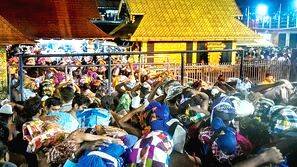

In a significant policy shift, Chief Minister Pinarayi Vijayan announced in the Kerala Legislative Assembly yesterday that pilgrims arriving without prior registration for the upcoming Mandala-Makaravilakku pilgrimage will be ensured a smooth darshan at Sabarimala. This move comes after mounting public pressure and protests, following the decision to allow access only through the virtual queue system, announced jointly by the state government and the Travancore Devaswom Board.
Earlier, the Devaswom Board had clarified that, unlike in previous years, there would be no spot booking facility for pilgrims, sparking widespread discontent across the state. The board's decision led to strong opposition from religious communities and political parties alike, who argued that many devotees were unfamiliar with the virtual queue system and relied on spot bookings from past experiences.
As political tensions escalated, with demands for spot booking growing louder—most notably from ruling party leaders such as CPM state secretary M V Govindan—the government was forced to reconsider its stance. Govindan's public support for reinstating spot booking highlighted the growing rift between government policy and public sentiment.
In response to the backlash, Chief Minister Vijayan's recent announcement aimed to quell unrest, assuring that pilgrims without online registration would not be turned away. Although the Chief Minister stopped short of confirming the return of spot booking, his statement suggests a more flexible approach to managing pilgrim flow.
The original decision to eliminate spot booking was justified by the Devaswom Board as a measure to ensure the safety of devotees. However, critics, including prominent writer T. Padmanabhan, denounced this reasoning as baseless, arguing that modern systems could easily handle large numbers of visitors by recording personal information at entry points. Padmanabhan, along with other social and religious leaders, voiced their opposition through media platforms like Kerala Kaumudi, further intensifying the debate.
The government's reversal on the issue has been welcomed by many, but questions remain over why it took so long to address public concerns. The delay in making a decision, despite the unanimous demands from devotees, political parties and socio-religious organizations, has drawn criticism. Moving forward, the challenge will be ensuring an efficient and safe darshan experience for all pilgrims, regardless of their familiarity with the virtual queue system.